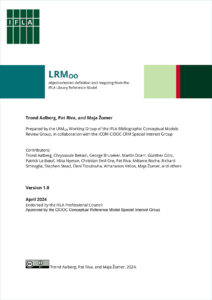Now available: Object-oriented LRM conceptual model
13 December 2024

LRMoo is newly available in the IFLA repository. It is a conceptual model that expresses the IFLA Library Reference Model (IFLA LRM) in an object-oriented modeling framework. Its approval by the Professional Council in April 2024 marked the conclusion of a project launched by the Bibliographic Conceptual Models Review Group (BCM RG) in 2017, shortly after the publication of IFLA LRM. LRMoo is a high-level, compact model that is tightly aligned with IFLA LRM and reflects its decisions about scope and granularity.
Developed through joint work in the library and museum communities, it is compatible with and an extension of the museum community model, the CIDOC Conceptual Reference Model (CRM). LRMoo version 1.0 is aligned with CIDOC CRM version 7.1.3, the current official release. In a unique example of shared standards, LRMoo is also officially endorsed through ICOM.
This close collaboration between the BCM RG and ICOM’s CIDOC CRM Special Interest Group started in 2003 with the idea of creating a bridge between the models of the two communities by stating the library model, at the time FRBR, in a way that could be used in concert with the CIDOC CRM. This model was named FRBRoo (for object-oriented FRBR) and its version 1.0 was approved in 2010. LRMoo supersedes FRBRoo version 2.4, completed in 2016, the version of the object-oriented model that was expanded to reflect all three superseded FR models: FRBR, FRAD, and FRSAD.
Download
LRMoo: object-oriented definition and mapping from the IFLA Library Reference Model
LRMoo is a conceptual model that expresses the IFLA Library Reference Model (IFLA LRM) in an object-oriented modeling framework. Developed through joint work in the library and museum communities, it is compatible with and an extension of the museum community model, the CIDOC Conceptual Reference Mo...
The document defining the LRMoo model follows the format and layout prescribed for the CRM family models, making it possible to take advantage of tools developed by the maintainers of the CRM family of models for the direct generation of RDFS from the declarations.
– Pat Riva, Secretary – IFLA Advisory Committee on Standards